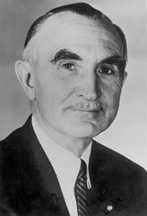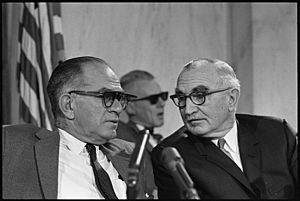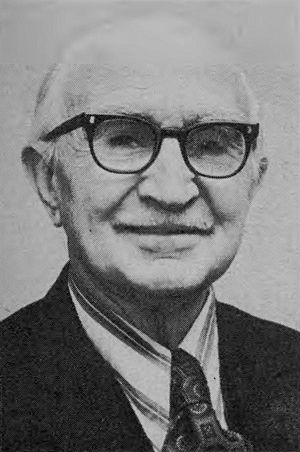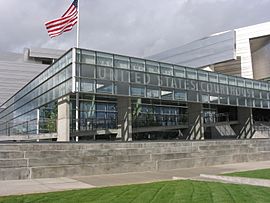Wayne Morse facts for kids
Quick facts for kids
Wayne Morse
|
|
|---|---|
 |
|
| United States Senator from Oregon |
|
| In office January 3, 1945 – January 3, 1969 |
|
| Preceded by | Rufus C. Holman |
| Succeeded by | Bob Packwood |
| Personal details | |
| Born |
Wayne Lyman Morse
October 20, 1900 Madison, Wisconsin, U.S. |
| Died | July 22, 1974 (aged 73) Portland, Oregon, U.S. |
| Resting place | Rest-Haven Memorial Park Eugene, Oregon, U.S. |
| Nationality | American |
| Political party | Democratic (from 1955) |
| Other political affiliations |
|
| Spouse |
Mildred Martha "Midge" Downie
(m. 1924) |
| Children | 3 |
| Parents | Wilbur F. Morse Jessie Elnora White Morse |
| Alma mater | University of Wisconsin (BA, MA) University of Minnesota (LLB) Columbia University (LLM, SJD) |
| Occupation |
|
| Military service | |
| Allegiance | United States |
| Branch/service | U.S. Army Reserve |
| Years of service | 1923–1929 |
| Rank | |
| Unit | Field artillery |
Wayne Lyman Morse (October 20, 1900 – July 22, 1974) was an American lawyer and a United States Senator from Oregon. He is remembered for often disagreeing with his own political party. He was also well-known for strongly opposing the Vietnam War. He believed the war was against the rules of the United States Constitution.
Morse was born in Madison, Wisconsin. He studied at the University of Wisconsin and the University of Minnesota Law School. In 1930, he moved to Oregon. There, he started teaching at the University of Oregon School of Law. During World War II, he was elected to the U.S. Senate as a Republican.
After Dwight D. Eisenhower became president in 1952, Morse became an Independent senator. While independent, he set a record for a very long filibuster. This is when a senator speaks for a long time to delay a vote. In February 1955, Morse joined the Democratic Party. He was reelected twice as a Democrat.
In 1960, Morse briefly ran for president. In 1964, he was one of only two senators to vote against the Gulf of Tonkin Resolution. This resolution allowed the president to take military action in Vietnam without a formal declaration of war. He continued to speak out against the war. He lost his reelection bid in 1968 to Bob Packwood. Packwood criticized Morse's strong opposition to the war. Morse tried to be reelected to the Senate two more times before he died in 1974.
Contents
Early Life and Education
Wayne Morse was born on October 20, 1900, in Madison, Wisconsin. His parents, Wilbur and Jessie Morse, farmed a large plot of land near Verona. Wayne grew up on this farm with his four siblings. They raised many different animals and crops.
His mother, Jessie, encouraged the family to have nightly discussions. They talked about farming, education, and especially politics. The family was progressive, like many of their neighbors. They discussed ideas from Robert M. La Follette, Sr., a progressive leader. These talks helped Morse develop strong debating skills. He formed firm opinions about politics, workers' rights, and education.
Morse and his siblings first went to a one-room school. But his parents wanted them to have a better education. So, they enrolled him in Longfellow School in Madison. Morse rode horses 22 miles each day to get there. He later attended Madison High School. He became class president and led the debating club. He was one of the top students in his class.
Morse earned his bachelor's degree from the University of Wisconsin–Madison in 1923. He got his master's degree in speech the next year. In 1924, he married Mildred "Midge" Downie, whom he had known since third grade. For several years, he taught speech at the University of Minnesota Law School. He earned his law degree there in 1928. He was also a U.S. Army Reserve officer from 1923 to 1929.

In 1929, Morse became a law professor at the University of Oregon School of Law. Within nine months, he was promoted to associate professor and then dean. At just 31 years old, he was the youngest dean of any law school approved by the American Bar Association. He earned his advanced law degree from Columbia Law School in 1932. Morse also served on many government groups and boards. He worked on issues like crime, labor, and national defense.
Becoming a United States Senator
First Term in the Senate
In 1944, Wayne Morse won the Republican election for senator. He defeated the current senator, Rufus C. Holman. He then won the general election in November. To get support, Morse presented himself as more conservative than he truly was. He criticized the New Deal, a series of programs by President Roosevelt.
Once in Washington, D.C., Morse showed his progressive beliefs. This surprised many conservative Republicans. Morse wanted to move the Republican Party to the left on union rights. His political heroes were progressive Republicans like Theodore Roosevelt. He even admitted voting for Franklin D. Roosevelt in the 1944 presidential election.
Morse believed that World War II was partly caused by America staying out of world affairs. In February 1945, he called for the U.S. to join the new United Nations (UN). He strongly believed in international law. He wanted the UN to be an "international police organization." He thought it should have the power to stop nations from breaking international law. He also wanted it to prevent rich nations from taking advantage of poor ones.
In March 1945, he urged the United States and the Soviet Union to work together after the war. He wanted them to keep the peace and end poverty worldwide. In November 1945, he worried about nations becoming too focused on their own power. He called for nations to stop dividing into "power blocs." He wanted them to take their disagreements to the World Court. He also believed the UN should control nuclear weapons.
Morse supported President Harry S. Truman's foreign policy as the Cold War began. He believed it was needed to stop Soviet expansion. Morse voted for the Truman Doctrine and the Marshall Plan. These programs helped other countries. He also voted for the U.S. to join NATO.
In 1950, President Truman sent U.S. forces to the Korean War. Morse supported this decision. He argued that the president had broad powers in emergencies. He also said the UN Security Council's resolution was binding. However, he warned Truman not to get "sucked" into a war in Asia. He also criticized supporting France in Vietnam.
Leaving the Republican Party
Morse was reelected in 1950. In 1951, he was seriously injured when a horse kicked him in the head. He had many facial injuries.
In 1952, Morse left the Republican Party. He did this to protest Dwight D. Eisenhower choosing Richard Nixon as his running mate. Morse also felt Eisenhower didn't criticize Senator Joseph McCarthy enough. Morse believed McCarthy was a threat to American democracy.
When the Senate met, Morse brought a folding chair. He wanted to sit between the Democrats and Republicans. This showed he didn't belong to either party. He expected to keep his committee roles but was denied some. He used a special rule to force a Senate vote, but he lost. Another senator, Herbert Lehman, offered Morse his seat on the Labor Committee, which Morse accepted.
In 1953, Morse spoke for 22 hours and 26 minutes. This was a filibuster against the Submerged Lands Act. At the time, it was the longest one-person filibuster in Senate history.
In 1954, France was losing the Battle of Dien Bien Phu in Vietnam. Eisenhower considered sending American troops. Morse spoke against this. He said Americans were not ready for a war in Indochina. He demanded that Congress vote on any military action first. After France's defeat, Morse accused Eisenhower of making the same mistakes. He thought the U.S. should work through the United Nations for a peaceful solution in Vietnam. He also wanted to promote economic growth there.
In late 1954, the First Taiwan Strait Crisis began. Morse fought against the Formosa Resolution. This resolution would have given the president power to use military force. Morse argued it violated the Constitution. He said only Congress could declare war.
In 1955, Lyndon B. Johnson, the Democratic Majority Leader, convinced Morse to join the Democratic Party.
Joining the Democratic Party
After being an independent for a term, Morse officially joined the Democratic Party in February 1955. He had campaigned for a Democratic Senate candidate in 1954. The New York Times reported his switch.
Despite changing parties, Morse was reelected to the United States Senate in 1956. He won a tough race against Douglas McKay. Their campaigns spent a lot of money, which was unusual for that time.
In 1957, Morse voted against the Civil Rights Act of 1957. He was the only senator not from the South to oppose it.
In 1959, Morse opposed Eisenhower's choice for ambassador to Brazil, Clare Boothe Luce. Morse had known Luce for years. He criticized her for comments she made about Franklin D. Roosevelt. The Senate approved Luce, but she then made a public comment about Morse's horse injury. This led to her resignation just three days after her appointment.
Final Senate Term
In 1961, Morse was upset by the Bay of Pigs Invasion in Cuba. He wrote to the Secretary of State, Dean Rusk. He accused the Kennedy administration of acting against the Constitution. He regretted that Congress was not told about the plan beforehand. In 1962, at a hearing for the new CIA director, Morse accused the CIA of having "unchecked executive power." He said their actions could easily start a war.
In the spring of 1964, Morse started calling the Vietnam War "McNamara's War." He named it after Defense Secretary Robert McNamara. On April 17, 1964, Morse said the U.S. was fighting an "illegal and unwise war" in Vietnam. A month later, when President Lyndon B. Johnson asked for more money for South Vietnam, Morse voted no. He accused Johnson of trying to get Congress to approve military action without declaring war.
On August 7, 1964, Morse was one of only two senators to vote against the Gulf of Tonkin Resolution. The other was Ernest Gruening from Alaska. This resolution allowed the U.S. to expand its involvement in the Vietnam War. Morse argued that it violated the Constitution. He said it gave the president power to take military action without a formal declaration of war.
Morse continued to be a strong critic of the war. It was later found that the FBI investigated Morse. This was because of his opposition to the war. It was believed President Johnson asked for this to find information against Morse. In June 1965, Morse joined anti-war protests in New York City. He often spoke at these events.

In February 1966, Senator J. William Fulbright held televised hearings about the Vietnam War. Morse was part of the committee. General Maxwell Taylor spoke against Morse's views. Morse told Taylor that Americans would soon reject the war. Taylor replied that this was "good news to Hanoi." Morse, angered, said he would not "get down in the gutter" with Taylor.
In the 1966 Senate election, Morse supported Republican Governor Mark Hatfield. This angered many in his own party. He supported Hatfield because Hatfield also opposed the Vietnam War. Hatfield won the race. In 1968, Morse won his party's nomination again, but by a small margin. He then lost his Senate seat to Bob Packwood. Packwood criticized Morse's opposition to funding the war. Packwood won by only 3,500 votes.
After the Senate
After losing his Senate seat in 1968, Wayne Morse tried to get it back. His first attempt was in 1972. He won the Democratic primary election. But he lost the general election to the current senator, Mark Hatfield. Morse had supported Hatfield in 1966.
On March 19, 1974, Morse, at age 73, filed to run for the Senate again. Three other Democrats ran against him. They made his age a main issue in the campaign. The New York Times said Morse would serve the state with "fierce integrity" if elected. Morse won the primary election. He then started preparing for the general election.
On July 21, 1974, Morse was hospitalized due to kidney failure. He died the next day. The New York Times wrote that his death "deprived the United States Senate of a superb public servant." The Oregon Democratic Party chose state Senator Betty Roberts to replace Morse as their candidate. Roberts lost to Bob Packwood in the fall election.
Legacy
Wayne Morse was known for not always sticking to one political party. This was seen as part of a long tradition in Western U.S. politics.
Morse had a state funeral on July 26, 1974. His body lay in state in the Capitol rotunda. Over 600 people attended his funeral. Many important politicians were there.
Years later, Congressman Al Ullman used Morse's slogan, "principle above politics." This was when Ullman ran for Senate. Since 1996, Ron Wyden has held Morse's old Senate seat. Wyden drove Morse during his last campaign when he was 19 years old.
In 2006, the Wayne L. Morse U.S. Courthouse opened in Eugene. The University of Oregon's William W. Knight Law Center also has the Wayne Morse Commons. The Wayne Morse Center for Law and Politics is also there. The Lane County Courthouse in Eugene has a Wayne L. Morse Free Speech Plaza. It has a statue and quotes from Morse.
The Morse family's 27-acre property in Eugene is called Edgewood Farm. It is listed on the National Register of Historic Places as the Wayne Morse Farm. The City of Eugene now runs this historical park. Wayne L. Morse is buried at Rest Haven Memorial Park in Eugene.
See Also
- List of United States senators who switched parties
 | Calvin Brent |
 | Walter T. Bailey |
 | Martha Cassell Thompson |
 | Alberta Jeannette Cassell |



